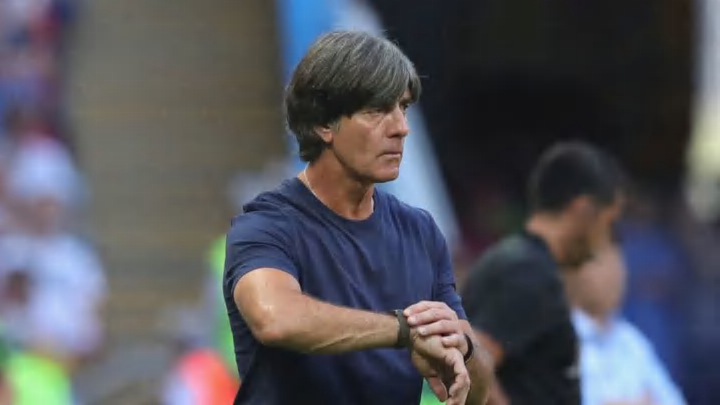Germany failed to advance out of the group stage for the first time in history after losing 2-0 to South Korea.
Time ran out for Germany in the World Cup. The defending champions entered the tournament as one of the favorites but never looked close to a team that could compete for a fifth title. The Germans were sloppy, disorganized and never showed an ability to generate great scoring opportunities.
Despite entering their final group-stage game knowing a win would likely guarantee them a spot in the round of 16, Germany showed no signs of improvement. No signs of the Germany team that reached the semifinals of every World Cup since 2006. No signs of the team that went undefeated in 2017. In six months, Germany magically got years older and slower, no longer a team that could run at the level required.
In their three games, Germany looked desperate, gifting opportunities to their opponents and struggling to defend after giving the ball away. They swung hopeful crosses into the box but never did anything with them. Joachim Low’s side seemingly entered the World Cup with one game plan in the final third. When that didn’t work, they didn’t have a backup plan. Following the game, Low said, “the responsibility is mine, absolutely.”
The warning signs were there. The Germans lost their first friendly leading up to the World Cup against Austria. In their final tune-up game, they barely beat Saudi Arabia. But there was faith in Low and his players to figure it out. With good reason: They had reached the semifinal in every major tournament under Low. They never clicked. There was no chemistry on the field. No matter what Low tried, it never worked.
Matthias Ginter was the only outfield player that Low didn’t play during the World Cup, not that Low’s decision not to play him will be second-guessed or talked about. It will be Low’s decision to leave Manchester City’s pacey winger Leroy Sane at home that will be discussed. Sane would have given Germany the pace they needed on the left wing but likely wouldn’t have been the difference. Sane wouldn’t have made the team look after the ball better, or defend ore effectively in transition.
With Germany’s World Cup over, the team moves to the future and what changes might be made. When they were knocked out in the group stage at Euro 2004, the entire German program was remade. Investments were made in youth academies across the country as they looked to develop more technically skilled players. Germany will likely go back and review what went wrong and what changes they can make within their youth academies.
The next question moves to Low’s future with the national team. “It’s too early for me to answer that question,” said Low following the game. While Low has an extension in place, it’s fair to wonder if he will come back. Low’s failure in Russia might prompt him to resign and seek a new challenge.
DFB President Reinhard Grindel to WAZ: "We decided before the World Cup for the contract extension, because we believe that the change that will take place after the World Cup, regardless of the outcome of the tournament, cannot be done better by anyone other than Jogi Löw." #GER
— Ronan Murphy (@swearimnotpaul) June 27, 2018
As for the players, Manuel Neuer, Mats Hummels, Jerome Boateng, Sami Khedira, Mesut Ozil, Thomas Muller and Mario Gomez have likely played their last World Cup game. It’s possible that three or four of those players won’t play for Germany at Euro 2020. In many ways, the 2018 World Cup was the end of an era for the players who rose out of Germany’s failure at Euro 2004.
